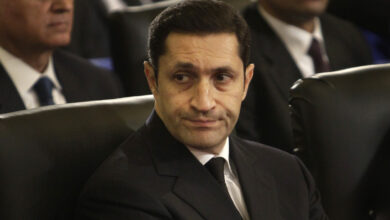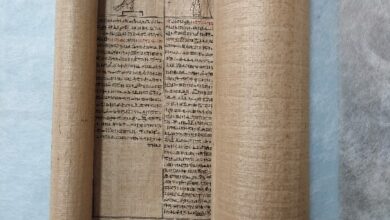Hosni Mubarak’s wealth is the main topic in most of Egypt’s papers on Monday. Al-Arabiya news channel broadcasted on Sunday the first audio recording of the former president since his ousting on 11 February. In the recording Mubarak alleges that he does not own any assets or real estate outside Egypt. He vowed to prosecute all those who “defamed” him.
The ongoing corruption cases were also prominently featured in Monday's papers, with Mubarak’s case having the most importance. Most papers are also still dealing with reactions to the clashes in Tahrir Square on Friday night.
Independent paper Al-Dostour calls Mubarak’s speech — in bold letters — “the shocker.” Political analysts say in the paper that they are surprised the ex-president, who is supposedly under house arrest, was allowed to make a statement to the general public on a satellite channel. They add it is “odd” that he was allowed to address the public prosecutor on television.
State-run Al-Akhbar analyzed the acoustics of Mubarak’s speech, saying that he spoke in a “presidential tone” and used terms used in presidential speeches. It says he appears to be in good health.
Al-Ahram, also state-run, says that the public prosecutor confirmed that Mubarak’s speech would not affect investigations of him. He has sent a subpoena to Mubarak and his sons to appear before investigators, which will also include a look into his role in many of the accused unlawful acts of the State Security apparatus.
Al-Shorouk, an independent paper, quotes an Armed Forces source that said that the Supreme Council of Armed Forces (SCAF) banned the speech from Egyptian television. The same source said that Mubarak, as a normal citizen, has every right to try and clear his name, and that he will be summoned from his Sharm el-Sheikh sanctuary. Along with Al-Dostour, the paper mentions Mubarak’s legal threat “to those who defamed him.” The Wafd party paper noted that Mubarak said he will “pursue” them.
Al-Wafd also picked up on a Washington Post article stating that the wealth Mubarak and his family stole from Egypt could be as much as an astronomical $700 billion. This figure, however, is based on a memo sent from the public prosecutor’s office to the US government. The memo states that Mubarak's sons and their partners purchased one of the debts of Egypt for 35 percent of its value and then collected the full 100 percent value from the Egyptian state budget.
As for anti-corruption cases, the latest prominent figures to be arrested for 15 days pending investigation are former Prime Minister Ahmed Nazif and formerly-ruling National Democratic Party (NDP) strongman Ibrahim Kamel. Al-Shorouk claims that Ibrahim Kamel called a meeting on Thursday with other NDP members, aiming to send NDP members and thugs to Tahrir Square on Friday to take over it by force and stay there for a couple of weeks. Kamel is seen as one of the main counterrevolutionary figures from the NDP.
Al-Dostour says that the SCAF has decided to take over the NDP headquarters because of the role its leaders played in Friday’s events. SCAF says that it did not open fire on the protesters in Tahrir that night, despite allegations that many were injured by military gunfire.
Al-Wafd says that the criminal court supports the public prosecutor’s decision to freeze the assets of some of Mubarak’s closest confidantes, including Zakaria Azmy, Safwat Al-Sherif and former Housing Minister Mohamed Ibrahim Suleiman.
In economic news, Al-Shorouk and Al-Dostour say that the rise in vegetable prices has driven Egypt to the highest rates of inflation since the crippling prices of 11 months ago. Al-Ahram, oddly, says that these prices are actually stable and that they may have actually gone down due to a new harvest. Al-Ahram and Al-Dostour both report on stock market chief Mohamed Abdelsalam’s promotional trip to the Gulf, which is meant to draw capital to Egypt.
One of the main issues gripping the political scene in Egypt is the proposed dissolution of the Popular Municipal Committees. Al-Ahram released a report saying that they are just “political decorations” designed to prop up the NDP and that they must be dissolved.
Many of Al-Shorouk’s op-eds deal with regional news. Clofis Maqsood says that the “infectious” uprisings in the Arab world must stand hand-in-hand in order to gain strength from each other. Wissam Bandooh writes about the Yemeni “time bomb," saying that the 30 years of Abdullah Saleh’s rule is the reason behind it.
In the presidential pageantry, Amr Moussa and Mohamed ElBaradei appeared prominently in the papers. In a long interview in Al-Shorouk, ElBaradei said that poverty will be his main preoccupation and that he will soon tour the streets to speak to people. Al-Ahram and Al-Dostour report on his speech at the American University in Cairo yesterday, in which he said that we are going through a phase when attempts are being made to create a rift between the people and the military, and that the NDP must be dissolved.
Egypt's papers:
Al-Ahram: Daily, state-run, largest distribution in Egypt
Al-Akhbar: Daily, state-run, second to Al-Ahram in institutional size
Al-Gomhorriya: Daily, state-run
Rose al-Youssef: Daily, state-run
Al-Dostour: Daily, privately owned
Al-Shorouk: Daily, privately owned
Al-Wafd: Daily, published by the liberal Wafd Party
Al-Arabi: Weekly, published by the Arab Nasserist party
Youm7: Weekly, privately owned
Sawt al-Umma: Weekly, privately owned




